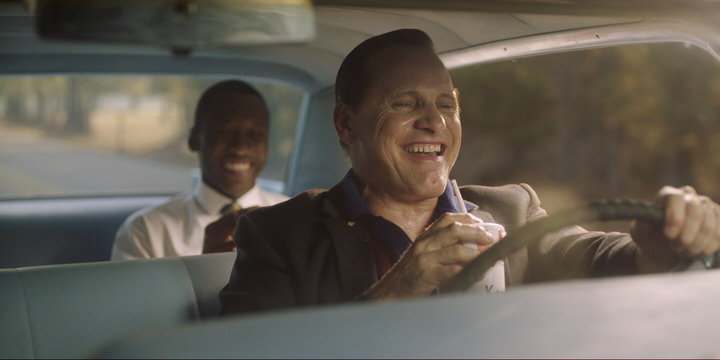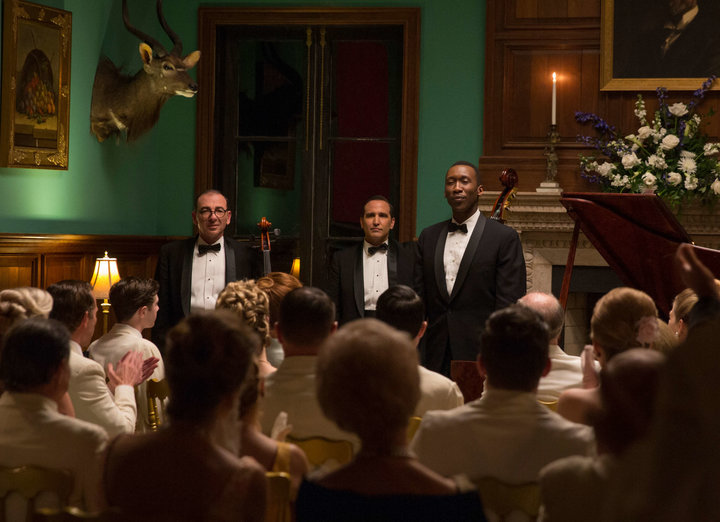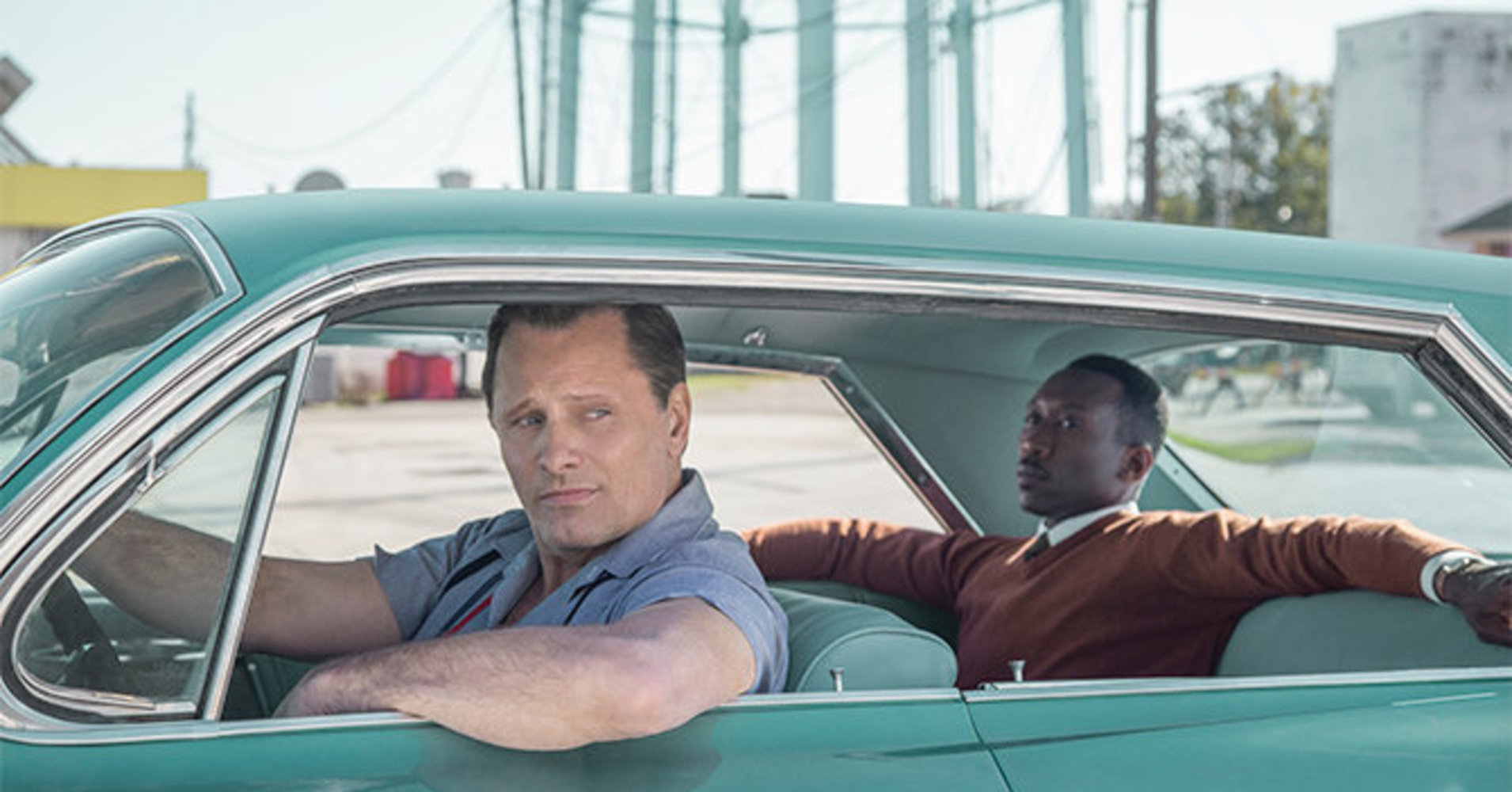[ad_1]
It’s time to talk about “Green Book,” the Peter Farrelly-directed buddy comedy/road trip saga/historical dramedy that’s earned so many accolades this awards season that we can no longer ignore its cloying existence.
The film, inspired by a true story, centers on the unlikely friendship between white nightclub bouncer Tony “Lip” Vallelonga (Viggo Mortenson) and black concert pianist Don Shirley (Mahershala Ali), who employs Tony to be his driver for a two-month trip through the American South.
Tony is loud, uncouth and laid-back, while Don is, well, the opposite of Tony entirely. Their time together, however, teaches them things, as so many cinematic odd couple pairings tend to do: Don learns to let go of his need to seem “respectable” in the eyes of white people. Tony learns to let go of some of his strongly held (racist) beliefs about black people.
It all sounds nice enough. Simple. “Green Book” harks back to a golden age of feel-good cinema, when, in the 1980s and ’90s, bonding journeys did a great job of pulling at audiences’ heartstrings. Farrelly’s film, nominated for several Golden Globes in the year 2018, has certainly pulled at some people’s heartstrings. (New York Magazine’s David Edelstein called it “pleasantly simpleminded” and “great fun.” In a statement released in response to his Golden Globe nomination for Best Actor, Mortenson described it as “a story equal to the best work of Frank Capra and Preston Sturges.” It’s doing reasonably well at the box office.)
But the movie has also received a good heap of criticism for clumsily rehashing and over-simplifying decades of racial dynamics in America. (New York Times’ A.O. Scott sums it up in one line: “There’s not much here you haven’t seen before, and very little that can’t be described as crude, obvious and borderline offensive, even as it tries to be uplifting and affirmative.”)
So what is it? A harmless, feel-good flick about how friendship can overcome racial differences? Or is it just another distorted, if well-meaning, “white savior” narrative from Hollywood? Critics Zeba Blay and Matt Jacobs sat down to chat about the movie’s merits (or lack there of), and why it might be resonating with moviegoers.
Zeba Blay: So, Matt, we’re talking about “Green Book” today. But there’s a problem: I have nothing to say about it other than, “BLAH.” When was the last time there was such a boring movie about ~race~ out?
Matt Jacobs: I hear you. But a confession is in order: I think “Green Book” is wildly entertaining ― the sort of broad, cheesy crowd-pleaser that used to open weekly. And that’s what makes the movie so unforgivable. Something this misguided and reductive shouldn’t be allowed to be so enjoyable. Talk me off the ledge, Zeba.
Zeba: Wildly entertaining, you say? Whew, chiiiile! I have to say, I’m a little shook. Because I think we tend to have similar takes on movies, but in this case, the broadness, the cheesiness, and the predictability of this script is exactly the sort of things that made it unentertaining to me. I’ve been reading so many reviews about this film that say “Sure, it’s kinda racist, but it’s so much fun!” I really fail to see the fun here. I didn’t even find the performances, which seem to be the most-praised thing about this movie, particularly compelling (especially Mortensen). I guess, in order to accept this movie as a crowd-pleaser, one must consider which crowds it’s pleasing. I think the things that make this movie “feel good” are, quite frankly, the things that make people feel good about not being aggressively racist. And that, to me, is the most boring thing of all.
In that respect, I agree with you: I think it’s a bad thing when a movie this willfully bland, on so manly levels, gets passed off as a heartwarming buddy movie and nothing else. But tell me: What in this movie worked for you?

Ming Pao Weekly
Matt: We’re more in agreement here than you might think, because everything you just said is spot-on. The aspects that worked for me ― and I use the idea of it “working” somewhat loosely ― have more to do with Hollywood’s present landscape than anything else. The zippy, dialogue-driven, wide-release dramedies that were omnipresent in the 1980s and ’90s are few and far between these days, and I’d take more of those and far, far less of whatever “Transformers” spinoff is opening next. “Green Book,” in some sense, reminded me of that era.
But the middlebrow tone also works to its disadvantage, because the movie that would have felt at home 20 years ago, the ideas it’s proffering, aren’t any more thoughtful or progressive. I mean, in “Green Book,” a white man teaches a black man how to eat fried chicken, for chrissakes. What can we even make of that scene?
Zeba: That scene in particular epitomizes a lot of what’s off about this movie. I didn’t think there was anything inherently offensive about the scene, but, boy, was it self-aware. Like, I see what you’re doing, movie, and you see that I see what you’re doing, and you’re feeling pretty clever and patting yourself on the back when, in actuality, you’re not doing/saying anything that interesting or provocative at all.
I found the tension around Don Shirley’s blackness here and throughout the movie incredibly reductive and overdone. Throughout the movie there’s this exchange happening between Don and Tony, in which Tony helps Don get in touch with his blackness and Don helps Tony realize that not all “blacks” are so bad, which is the entire movie in a nutshell. And it’s just so uninteresting. Just like that scene! What did you think about Don and Tony’s dynamic/friendship here? Did you think the power dynamics between them brought up anything compelling?
Matt: Only the chance for two talented actors to riff off each other, especially Ali, who manages to make the steely, starchy Don the pair’s more magnetizing half. But in terms of social commentary? No way. It plays into all the obvious tropes, leaving us no room to expect anything but a feel-good conclusion that lets everyone pat themselves on the back for watching two dudes overcome a sliver of racism and classism. Maybe I wouldn’t mind it being presented as a buddy comedy if it offered the dual perspective it thinks it does. But this is Tony’s movie, and Don just happens to be in enough of it to eventually turn it into a two-hander. We begin and end at Tony’s New York apartment, and everything that happens in between is positioned predominately through his POV ― a big pitfall on the movie’s part, since Don is the more relevant (and interesting) character.
How would you compare “Green Book” to, say, “The Help” or “Driving Miss Daisy,” in terms of breezy Hollywood movies that filter racial tensions through white protagonists’ eyes?

Ming Pao Weekly
Zeba: You’re so right about the wonky perspective in this movie. I mean, there’s a scene early on, in which we watch Tony throw out two glasses that a pair of black repairmen in his home drank from in disgust. He actually holds them between his forefinger and thumb as if the glasses are radioactive. This is the perspective through which I’m supposed to be comfortable watching this movie, the person with whom I’m expected to empathize with, the person I am supposed to believe is “not racist” anymore by the end of the movie? I checked out completely at that point.
I’ve never seen “Driving Miss Daisy,” but in the case of “The Help,” at least the racial awakening of the white protagonist is easier to believe. By the end of “Green Book,” there’s no part of me that can forget that glass scene. I’m sorry, but that kind of childish, seemingly benign racism is not the sort of thing that goes away. Maybe this is veering off a little from your original question, I’m sorry, but movies like that flourish because they absolve real-life white people of their real-life bullshit. The movie is just so flippant about everything ― race, queerness. It presents the real life stakes of these identities in Don’s life as simple problems for Tony to solve. That irks me.
Matt: Right, at least “The Help” isn’t about a white protagonist learning to overcome her own racism. Tony’s bigotry goes from 10 to 2 in a little more than two hours, and the thing that gets him there is … what? Realizing that his black friend is smarter than he is? Since the movie is clearly about Tony, it should have done more with his heritage (you know, other than scenes of his family eating pasta), given how much America discriminated against Italians in the early 20th century. You have to squint to make that connection because it’s so invested in exalting Tony as its white savior.
Another thing that irked me: the title. The Green Book was a guide that told black travelers which businesses were safe to patronize, but it’s only mentioned in passing here. That’s a rich history that’s largely unexplored, yet it serves as the film’s title, further proving how half-baked the nuances are. And now the story of Don Shirley — someone I wasn’t familiar with before — will be memorialized through a movie that’s not even about him OR the book that steered this small chapter of his life. Maybe that’s the ultimate travesty?
Zeba: Yes, yes, yes. The title truly is one of the most, if not the most, tone-deaf things about this movie. I’d much rather see a film about the creation of the Green Book and how it played into the lives of regular black folk than this movie.
I must say, as much as this movie gets wrong about race, as reductive and over-simplistic as it is, it inspires no actual outrage in me. Just pure disappointment. I think, at the end of the day, the most fascinating thing about the movie is the fact that it exists. It’s just hard to believe how a movie like this got made in 2018, how it managed to ensnare the talents of Mahershala Ali (cannot believe this is his first feature since “Moonlight”) or how there are actual critics praising it. All its racial blind spots aside, it is a mediocre movie at best and I do wonder if the racial themes weren’t running through this film, would it still be getting this type of praise?
So, you know how I feel ― I’d definitely tell people to skip this movie (in light of Viggo Mortensen’s recent comments on it alone). What about you? Do you think there are some kernels of worthiness here?
Matt: Ultimately, no. I still sorta think there’s something brisk and enjoyable about its pacing, mostly because I miss the enjoyably bloated PG-13 dramedies of yore. But this isn’t the reason to bring them back. We’ll see whether the Oscars elevate its profile — they do love simplistic movies about race, after all — but I’d like to think a good faction of America will see “Green Book” for what it is: trite, undercooked and, yep, disappointing.
This has been “Should You Watch It?” a weekly examination of movies and TV worth ― or not worth! ― your time.
[ad_2]
Source link

